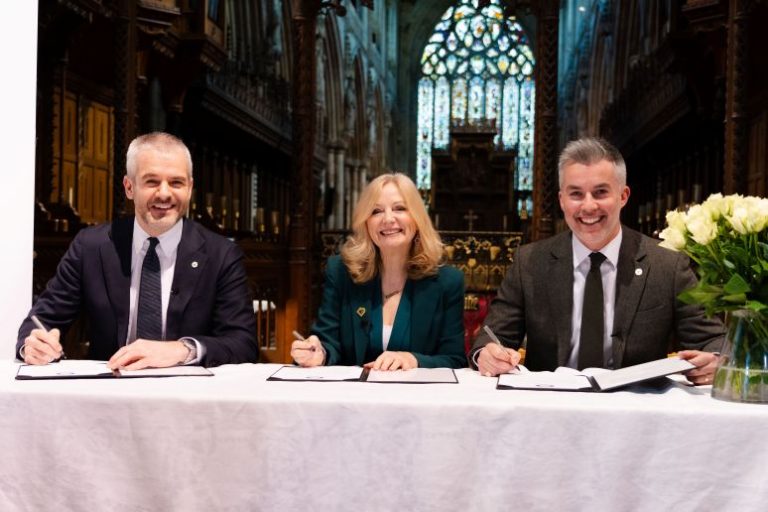A phased plan to fix Yorkshire’s broken railways, published by Lord Blunkett, could deliver a multi-billion pound boost to the government’s growth mission.
The peer’s review of rail connectivity has identified how constrained and creaking Victorian-era infrastructure is holding the region back, with train services regularly failing to meet the needs of both passengers and businesses due to poor performance and an overall lack of reliability.
Yorkshire’s Plan for Rail sets out a package of investment in new and accessible stations. Alongside modern rolling stock, improved services in the short term, upgrades to unlock capacity at key stations, development of strategic schemes to transform connectivity between the North’s major centres in the long term, will be investment for housing, jobs and growth. In addition, the report calls for increased powers as part of the devolution agenda to drive change.
It highlights the need for substantial government investment and support as part of the proposed 10-year infrastructure plan and spending review to be announced later this summer, with £2.4bn sought for the first phase of improvements between now and 2030 and approximately £14bn required over the next 15 years to deliver the plan in its entirety.
This is in addition to the £2.5bn funding needed to bring trams back to West Yorkshire and investment for tram extension and renewal in South Yorkshire.
The thrust of the report focuses on the need to deliver faster, more frequent and reliable train services by increasing capacity at Leeds, Sheffield and York stations, building a new through-station for Bradford and a mainline station at Rotherham, carrying out upgrades and electrification between Leeds and Sheffield, and increasing the frequency of services for places such as Scarborough, the Esk Valley, Penistone Line and Wakefield district’s Five Towns.
Over the next decade, targeted rail investment, which will maximise the benefits of the ongoing Transpennine Route Upgrade programme being delivered by Network Rail, has the potential to add £20bn to the region’s economy, could help generate an extra 83,000 jobs, and contribute to the building of 210,000 new homes over ten years.
The review is being launched in Leeds today (Friday 16th May) by Lord Blunkett, alongside West Yorkshire Mayor Tracy Brabin, South Yorkshire Mayor Oliver Coppard and York and North Yorkshire Mayor David Skaith.
Lord Blunkett said: “Yorkshire has been punching under its weight for far too long, and with the White Rose Agreement and this infrastructure plan, the three Mayors are determined to reverse this historic trend.
“It’s been a pleasure to be asked to pull together this credible and affordable plan, which presents a once in a lifetime opportunity to improve rail connectivity, and unlock economic growth and opportunities for all.
“By taking action now, the benefits of releasing capacity, speeding up journeys, improving reliability and running more frequent services will be felt not just here, but across the North, Midlands and beyond.
“It’s time to back Yorkshire.”
Tracy Brabin, mayor of West Yorkshire, said: “We are incredibly grateful to Lord Blunkett for leading this vital and timely review as we work together to create a better-connected region that works for all.
“A lack of investment stretching back decades has left Yorkshire with a rail network no longer fit for purpose. This is holding back ambitious growth plans for our regions which will put more money in people’s pockets.
“We owe it to everyone, especially younger generations, to secure our fair share of funding so the region’s train services are suitable for the modern age, getting passengers to where they need to go, when they want to go.”
The mayor of York and North Yorkshire, David Skaith, said: “Working together, we can drive real change and boost opportunities across our region. This is a credible, long-term plan to deliver the connectivity our communities need – creating better access to jobs, education and investment.
“In York and North Yorkshire, that means two trains an hour between York and Scarborough, upgraded stations at Malton, Seamer and Scarborough, and a new station at Haxby.
“We need to push forward with the transformation of York Station to maximise the benefits of York Central, one of the most significant regeneration sites in the country. And we need to fix the bottleneck on the East Coast Mainline at Northallerton, which has held back progress for too long.
“We’re ready to build a better-connected North, creating the growth, opportunity, and prosperity our communities deserve.”
South Yorkshire’s mayor Oliver Coppard said: “David Blunkett has, for the first time, made clear the problems created by decades of underinvestment across the whole of Yorkshire and given us a Plan for fixing them, working together across the whole of God’s Own Country. This is the White Rose Agreement in action.
“The Plan we are launching today would address the fundamental issues we face as a region. Here in South Yorkshire we need more trains, investment in our stations, and better connections to Leeds, York, Manchester, London and elsewhere.
“Ultimately, we simply want reliable, effective rail services, so we can get to work, see friends and family or just go for a night out.
“Through this Plan, there is a pathway with a phased approach to fix our broken rail system. I want to see Sheffield fully electrified, a new station at Rotherham, more capacity at Doncaster and new services between Barnsley and London.
“Thanks to the work of Lord Blunkett, as the three White Rose Yorkshire Mayors, we will work with the government and rail industry partners to turn this Plan into action. We’re getting Rail in Yorkshire back on track.”
The White Rose region’s population now stands at 4.6m, having grown by more than half a million in the past decade.
It generates £127bn Gross Value Added (GVA) for the national economy – larger than 10 European Union Countries, but is £25bn smaller than it should be.
The report makes the strong strategic case for investing more in rail as part of a wider regional growth strategy and closing the productivity gap by creating more opportunities, connecting young people to jobs, providing a real incentive for potential employers to relocate, and promoting more sustainable travel.
Previous studies have also shown that demand for rail across the Yorkshire and Humber region could be more than doubled if constraints such as price, performance and convenience were addressed.
In particular, the leisure market has been identified as an opportunity to grow passenger numbers if services were improved as Yorkshire has a diverse range of cultural attractions, from world-class museums and historical sites to vibrant arts and cultural events, alongside stunning scenery, national parks and miles of coastline.
The report sets out a plan to enhance Yorkshire’s rail network in a sustainable, affordable and credible way with a phased approach.
In the first five years investment is proposed to deliver:
- New stations at Haxby, Elland, White Rose, Thorpe Park, Rotherham Gateway, Waverley, Leeds-Bradford Airport Parkway, and Dearne Valley Parkway.
- Business case development for a new through-station at Bradford and NPR network.
- Station capacity at Leeds and Sheffield
- Station upgrades at Malton, Seamer, and Scarborough
- Platform extensions across the network
- Leeds platform 17 extension
- Platform 0 Bradford Forster Square
- New/improved services for Bradford – Kings Cross, Leeds – Sheffield (fast), Sheffield – York XC (reinstated), Leeds – Goole, Bradford Forster Square – Skipton/Ilkley, Barnsley – London (peak), Wakefield and Five Towns, Penistone Line, Esk Valley, and York – Scarborough.
- New rolling stock for Northern leading to longer trains and more frequent services.
- Extension and renewal of the South Yorkshire tram network, and spades in the ground on West Yorkshire’s tram network.
- Ongoing Transpennine Route Upgrade programme between Manchester, Huddersfield, Leeds and York.
A number of key challenges need to be addressed, from poor performance and reliability to slow journeys, infrequent trains and limited seats:
- Nationally, Leeds rail station is by far the worst location across the UK in terms of total minutes delay, with Sheffield, York and Bradford Interchange also in the top 10.
- Connectivity across the region is a challenge: for example, there are only five fast services a day between Sheffield and York, compared to four per hour between Liverpool and Manchester.
- Meanwhile, commuters living in parts of Yorkshire cannot use trains to travel to work due to a lack of early services, while other areas have no late services for those wanting to go on a night out.
- Poor off peak and weekend services limit journey opportunities, particularly for leisure travel and staycations.
- Older trains not only impact service reliability, they also lead to an unattractive public transport offer. Northern Rail, which operates most of the services across the White Rose region, has an average fleet age of 23.6 years compared to 16.6 years nationally.





















